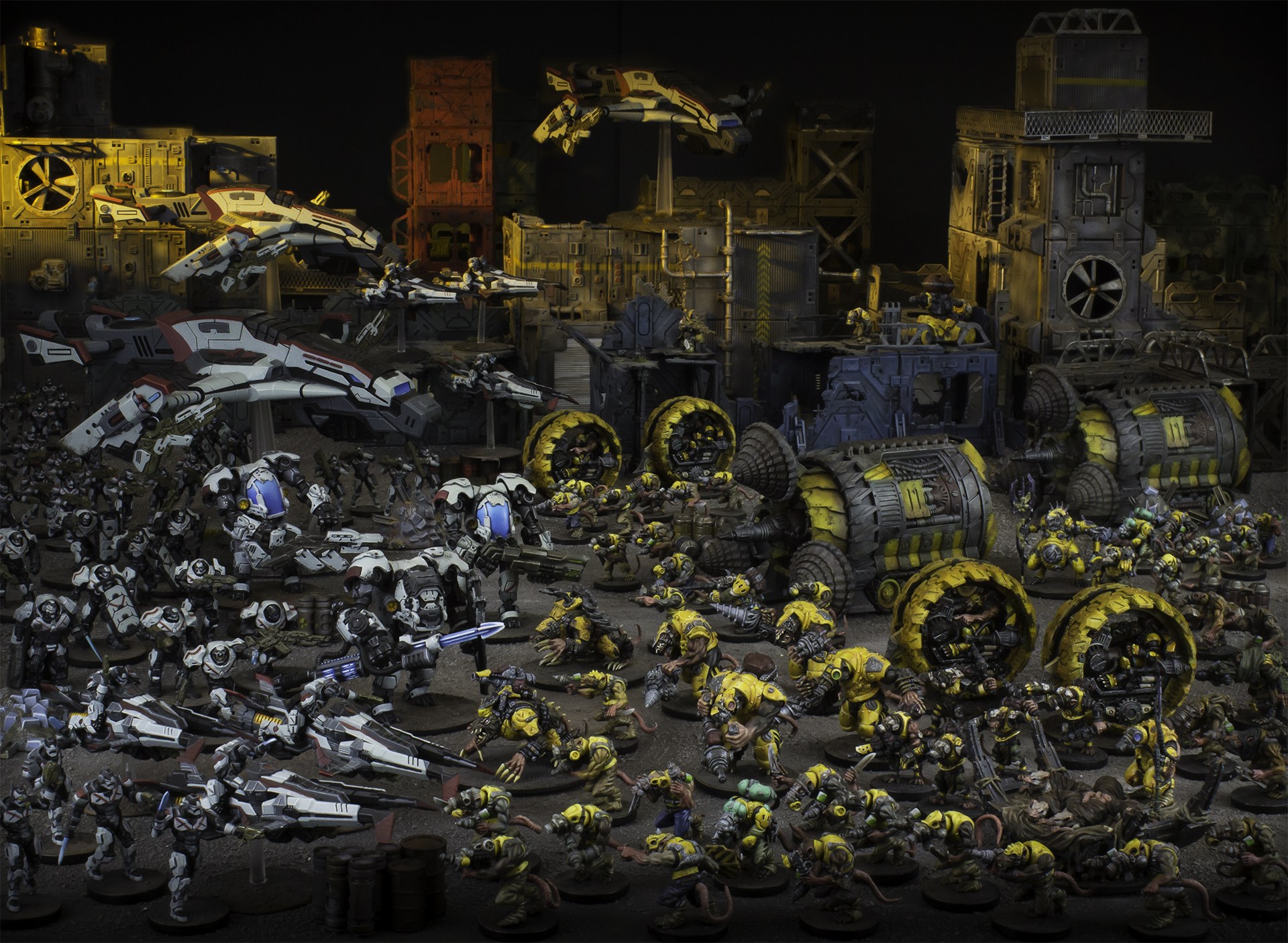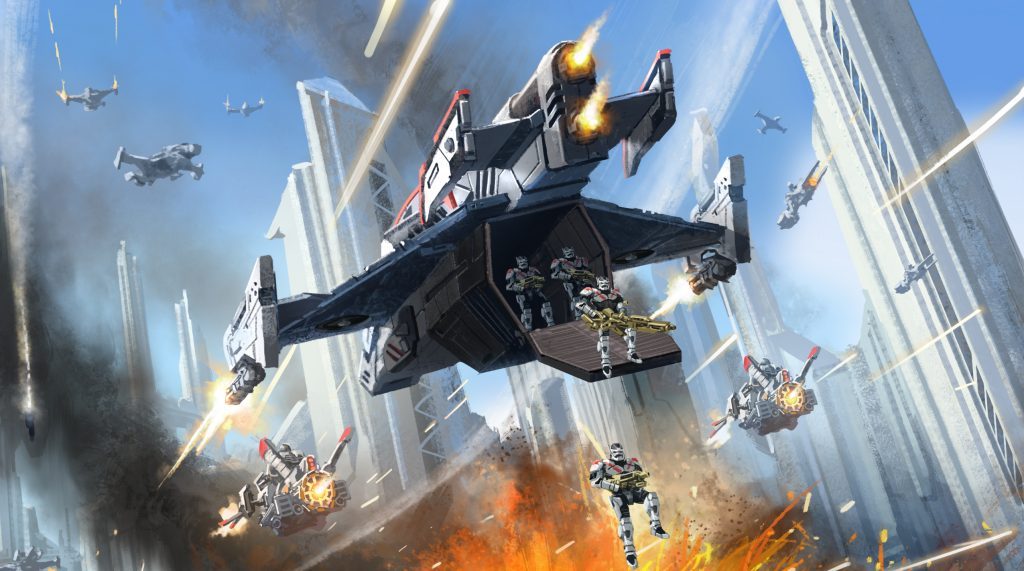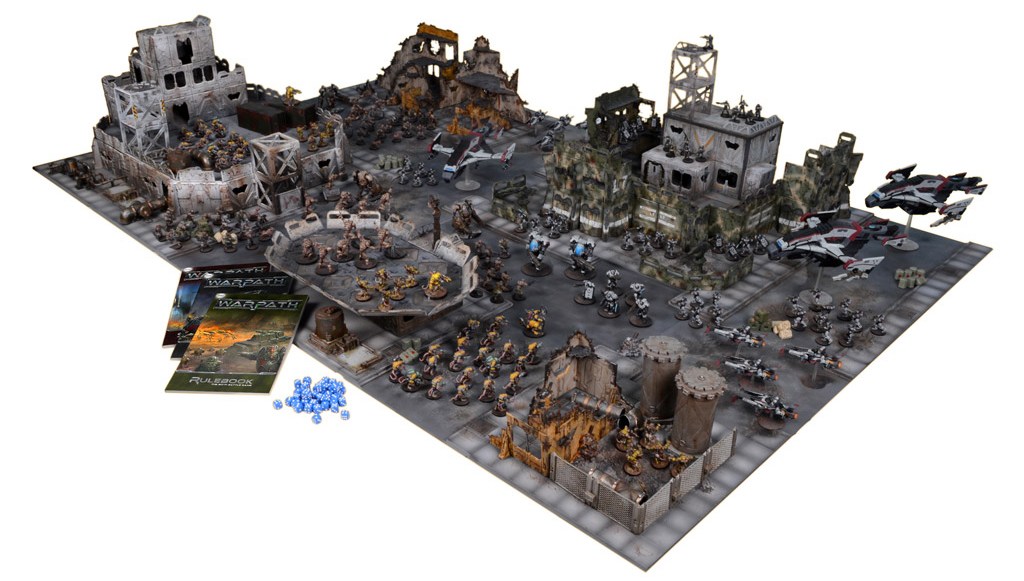
Warpath FAQ & Errata – June 2019
Today we’re handing over to the members of the Warpath RC to explain what’s been changed in the brand-new FAQ and errata. Over to you Michael Kaup, with Jared Fulcher and Tyler Schultz. Plus, make sure you read to the end of the article for a great offer on the Warpath rulebook and armies.

New errata is now available for Warpath: the futuristic battle game. Mantic tasked the Rules Committee, Jared Fulcher, Tyler Schulz, and Michael Kaup, with writing errata to create a more balanced, fun gaming experience. We have endeavoured to make minimal changes that produce maximum impact upon the game while keeping everything players love about it.
The changes implemented in this errata are significant, and include changes to Mission set-up, Strategic Assets and Secondary Objectives, Orders, Cover, Point Costs, and structure of Picking a Force. This blog introduces and explains the most significant changes made. For those who love Warpath already, we hope the errata makes the game better. For those who have been less enthused by Warpath in the past, we hope this errata inspires you to reconsider, and try to play this more balanced more fun iteration of Warpath.
In creating a more balanced and fun Warpath,
we modified Strategic Asset set-up, removed the Refresh Order, streamlined
terrain bonuses to cover and defensible terrain, adjusted Unit point costs for
the largest offenders, removed orbital commanders, and created more structure
in building army lists.
STRATEGIC ASSETS
The procedure for placing Strategic Assets now
occurs as follows: “At the start of the game, after rolling for Initiative the
winner rolls D3+2 and splits that many Strategic Asset counters with the
opponent. If there are an odd number of Strategic Counters, the player with
initiative takes the final counter.”
This change reduces the number of Strategic assets by half. As a result each has more impact on the game,
and will draw Forces to each other creating more conflict. The larger number of Strategic Assets
incentivized players to pursue uncontested objectives, and combined with the
destructive power of Units, there were often more strategic assets than Units
on the table could hold or contest. This
is why reducing their number increase their impact on the game.
Having adjusted game set-up and missions,
units, point costs, and orders, they must now work in concert with the
missions, assets, and secondary objectives.
In particular, the destructive
power of units and abilities should function at a pace that works with the
structure and victory points for missions and secondary objectives.
REFRESH, REFRESHED
The largest single change in this vein is that
we removed the Refresh Order from the game.
Players, naturally, used Refresh on their best units, and on units that
are strongest. This makes the most
broken and overpowered units 2 or 3 times as broken and overpowered. It makes the worst part of any matchup 2
times as bad, and does so for both players.
It also speeds up the pace of destruction such that secondary objectives
and strategic assets too often become irrelevant.
With Refresh removed, there are now more
opportunities to gain and use Command Dice, Warpath now features the same
Command dice recovery that Firefight does, “At the start of each turn (except
for the first) both players roll any used Command dice they have at the side of
the board. Any that role a + are returned to the pool.”

CHANGES TO COVER
Cover bonuses have been streamlined to just
Cover, and Defensible Terrain.
Furthermore the benefits of Defensible Terrain have been scaled back to
confer Headstrong, which allows a unit to remove 1 suppression token at the
beginning of its activation, rather than Unflinching which also ignores initial
suppression when the unit is hit by shooting.
This keeps more of the suppression created on the board, which makes
using suppression as a tactic more powerful, and increases the importance of
dealing with supression through actions and orders. See the official Errata for the complete
changes to Cover and terrain.
In an effort to make the game less lethal,
Shooting units can now only destroy Eligible Targets. This is a new game term and rule, “You
may only remove Teams from the targeted Unit that are Eligible Targets. An Eligible Target is a team in a unit to
which the shooting unit has line of sight.
Units to which line of sight cannot be drawn are never eligible target
for casualty removal. When removing
casualties, if you still have damage to apply after removing all Eligible
Targets, that damage is ignored and no further casualties may be removed.” This change eliminates the daisy chain effect
that allowed a shooting unit to kill all teams in a unit even if it only has
LOS to some.
A few new factors give further structure to
force composition. Forces now require
25% of a force to be regular infantry, “At Least 25% of your force’s points
must be spent on non-HVA Regular Infantry units.” We added HVA values to a number of units in
order to restrict the impact of the most powerful units, and lead players to
make careful choices about which HVA units they choose and how many of each
they will field. These changes were
implemented rather than a more formal force organization chart or unlocking
system such as those seen in Deadzone, or Kings of War.

BUT WAIT, THERE’S MORE!
We removed Orbital Commanders from the
game. These units, while thematic,
create initial bombardments that detract from careful gameplay on the
tabletop. Removing Orbital commanders
places more emphasis upon using your units on the board. Furthemore, as a miniatures game, Orbital
Commanders are not represented as miniatures on the board, and this runs counter
to the aesthetic and style of gameplay of a miniatures wargame.
Finally, we changed many Unit’s Point Costs to
be commensurate with other similar types of Units. All Flyers and Tanks now have point costs
closer to 220pts. Artillery, vehicle
destroying Units, and particularly effective troop killing units cost about
150pts. In general, we sought to raise
the costs of overperforming units, and decrease the costs of underperforming
units.
Between compulsory infantry, more HVA values,
and point costs changes, we see Forces that are more balanced with each other,
and are better suited to Warpath’s missions and objectives. We hope this errata leads to better, and more
fun games.
In an
era where corporate power rivals that of governments, commerce sets the
boundaries which violence must disrupt.
Now is the time to disrupt those boundaries which have set galactic forces against you. Prepare your troops, set sights on your objective, and bring to bear all that you can upon this Warpath.
TO CELEBRATE THE LAUNCH OF THE WARPATH ERRATA, WE’VE GOT A SPECIAL OFFER! THE WARPATH RULEBOOK IS HALF PRICE FOR A LIMITED TIME, AND YOU CAN USE THE CODE ERRATA20 TO GET 20% OFF STARTER AND MEGA FORCES FROM THE MANTIC WEBSITE.
The post Warpath FAQ & Errata – June 2019 appeared first on Mantic Blog.
